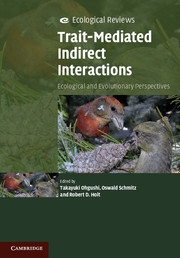Preface
Published online by Cambridge University Press: 05 February 2013
Summary
Preface
Ecologists have long found the complexity of ecological systems, brought about by the diversity of species and the myriad direct and indirect interactions among them, to be a source of awe. Such complexity represents a formidable scientific challenge as ecologists struggle to identify the fundamental mechanisms that make sense of the web of interactions that drive ecological functioning and sustainability. The most fundamental mechanism driving complexity is the process of evolution by natural selection, a process that requires variation in phenotypic traits among members of a species. One dimension of this variation is the propensity for organisms to show adaptive shifts in phenotypes to meet challenges imposed by changing environmental conditions. But this fundamental evolutionary mechanism seems somewhat forgotten in modern analyses of community and ecosystem dynamics, where conceptualizations and empirical approaches typically treat organisms (and entire species) as having a fixed set of phenotypic traits, invariant to changes in environmental contexts. Ecologists have largely ignored the community and ecosystem consequences of phenotypic adjustment to environmental conditions, and thereby effectively have overlooked the potential to explain much of context-dependency (and hence variation) in species interactions. Taking into account such flexibility in individual traits will, we believe, enhance the power of our field to explain ecological patterns and to predict the consequences of environmental change.
This volume grew from a symposium entitled ‘Trait-mediated indirect effects in insect communities’, held in Durban, South Africa, at the International Congress of Entomology meeting in July 2008. The symposium brought together a collection of international contributors uniquely qualified to evaluate and expand our understanding of how trait-mediated indirect effects structure insect communities. To offer a broader view of the field, we invited additional authors working in a wide range of ecological systems to contribute chapters. We intend to provide ecologists with insight into the ‘state-of-the-art’ of research focused on trait-based effects, an approach which can link in novel ways individual, population, community and ecosystem ecology. Our goal is to foster research on trait-mediated interactions and thereby stimulate ecologists to address more systematically how trait-based effects can modify expectations based on classical approaches that view traits as invariant across environments. This volume reveals in many ways how the conceptual framework of trait-mediated indirect interactions can greatly improve our understanding of evolutionary processes, population dynamics, community structure and stability, and ecosystem properties and functions.
- Type
- Chapter
- Information
- Trait-Mediated Indirect InteractionsEcological and Evolutionary Perspectives, pp. xv - xviPublisher: Cambridge University PressPrint publication year: 2012

